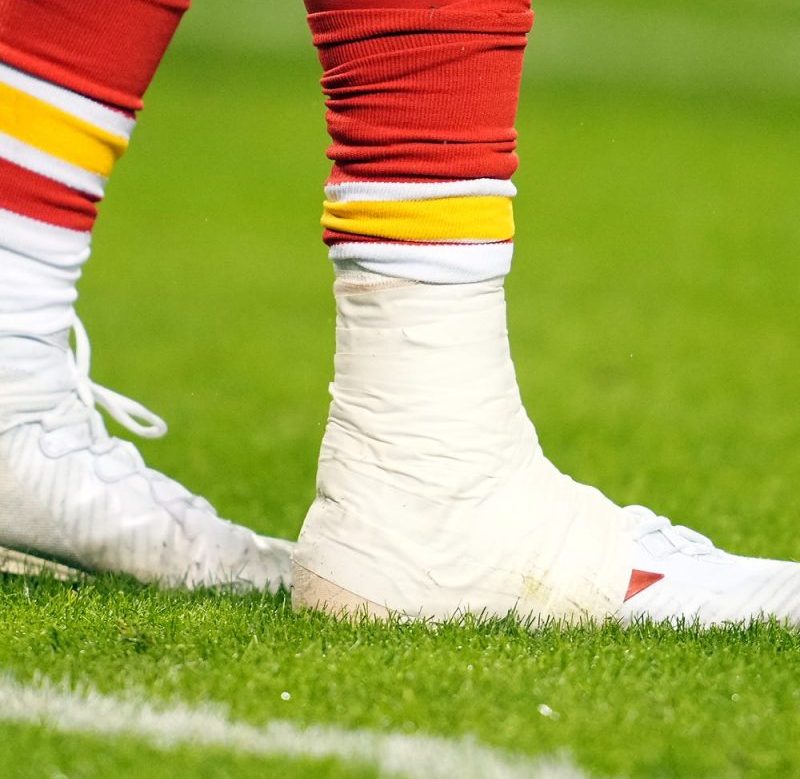
Chiefs QB Patrick Mahomes suffered a high ankle sprain. What is it?
Among sports-induced injuries, the high ankle sprain is getting special attention this week. It could help determine the matchup in this year’s Super Bowl.
Kansas City quarterback Patrick Mahomes will attempt to play Sunday when the Chiefs host the Cincinnati Bengals in the AFC championship game despite having suffered a high ankle sprain last weekend.
The injury to his right ankle temporarily sidelined Mahomes before he returned to action and helped lead the Chiefs to a 27-20 victory over the Jacksonville Jaguars on Saturday in an AFC divisional round game.
So what exactly is a high ankle sprain? How can it be treated? And what are the chances Mahomes will be in top form with a berth to the Super Bowl on the line?
High ankle sprain vs. normal ankle sprain
Follow every game: Latest NFL Scores and Schedules
Let’s start with the anatomy. The ankle joint is formed by three bones: the tibia (shin bone), the fibula (the bone next to the tibia in the outer calf) and the talus (a bone in the foot below the tibia).
A common ankle sprain involves the ligament in the ankle. By contrast, a high ankle sprain involves the ligaments above the ankle joint and can require surgery.
High ankle sprains are more common among athletes who participate in high-impact sports and usually result from “sudden twisting, turning or cutting motion while a person is running, jumping or falling,’’ according to the Hospital of Special Surgery, a New York hospital that specializes in orthopedic surgery.
High ankle sprain recovery time
Recovery from either a normal ankle sprain or high ankle sprain can take weeks to months. But as Mahomes demonstrated last weekend, professional athletes can perform even while they’re recovering – depending on certain factors.
The key factor is stability of the ankle, said David Oji, an orthopedic surgeon who treats athletes at Stanford University with foot and ankle injuries.
“If the ligaments are functioning, as long as his pain and his symptoms are very mild, they can aggressively rehab him and get him back to play,’’ Oji said.
Pain threshold is a factor, according to Oji, who said, “Everybody’s pain threshold is different.’’
Pain seemed of little consequence to Mahomes, who after the Chiefs beat the Jaguars told the media, ‘I’m not coming out of a playoff game unless they take me out. I’m just going to play. I love this sport too much.’
The injury can affect Mahomes’ mobility and ability to plant his right foot and throw.
Treating a high ankle sprain
A steroid injection or cortisol injection is a no-no because both can weaken the ligament and decrease healing, according to Oji.
“Injections are contraindicative in these high ankle sprains,’’ he said. “You’ll get short-term gain but long-term it will be detrimental to the athlete.’’
A 2022 study published in Sports Health concluded, ‘Injections are commonly used by health care practitioners to treat foot and ankle injuries in athletes despite ongoing questions regarding efficacy and safety.”
The basics include resting, icing and elevating the leg, and in some cases, the use of a walking boot, according to the American Orthopaedic Foot & Ankle Society.
”The goals of treatment are to move the tibia and fibula to the correct positions with respect to each other and to heal in those positions,” reports the American Orthopaedic Foot & Ankle Society. ‘This allows the ankle joint to function as intended.”
Testing the ankle for competition
Athletes typically go through a series of tests before they’re cleared to play. That includes X-rays and a stress test in addition to work with a trainer and physical therapist, all of which can be done within a week, according to Oji.
“As long as they pass some of those hurdles,” he said, ‘a lot of these athletes will be able to perform at a very high level.’’
